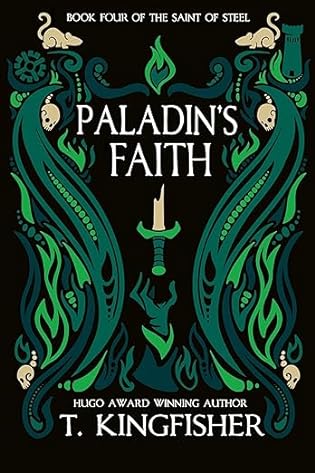 Paladin's Faith (The Saint of Steel, #4) by T. Kingfisher
Paladin's Faith (The Saint of Steel, #4) by T. Kingfisher Format: ebook
Source: purchased from Amazon
Formats available: hardcover, ebook
Genres: epic fantasy, fantasy, fantasy romance, romantasy
Series: Saint of Steel #4
Pages: 446
Published by Red Wombat Studio on December 5, 2023
Purchasing Info: Author's Website, Amazon, Barnes & Noble, Kobo, Bookshop.org, Better World Books
Goodreads
Marguerite Florian is a spy with two problems. A former employer wants her dead, and one of her new bodyguards is a far too good-looking paladin with a martyr complex.
Shane is a paladin with three problems. His god is dead, his client is much too attractive for his peace of mind, and a powerful organization is trying to have them both killed.
Add in a brilliant artificer with a device that may change the world, a glittering and dangerous court, and a demon-led cult, and Shane and Marguerite will be lucky to escape with their souls intact, never mind their hearts. . .
My Review:
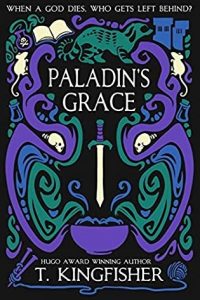 There’s a classic saying about large organizations at cross-purposes within themselves, that the right-hand doesn’t know what the left hand is doing. Marguerite Florian’s problem with the Red Sail mercantile empire is that their “right hand does not know who the left is killing”.
There’s a classic saying about large organizations at cross-purposes within themselves, that the right-hand doesn’t know what the left hand is doing. Marguerite Florian’s problem with the Red Sail mercantile empire is that their “right hand does not know who the left is killing”.
This is Marguerite’s problem because the person that the Red Sail’s left hand intends to kill is her. Which she has some strenuous objections to. Most people would.
Marguerite has tried all sorts of methods for getting the Red Sail off her back. Most parts of the organization think that she’s just a loose end, someone who knows something they shouldn’t but who clearly has no plans for doing anything about it. Someone who can be watched but otherwise left alone.
Other parts of the organization want to use her life – or rather her death – to score points against the others. For every Red Sail branch she does enough favors for to earn amnesty, there’s another who hates that branch and wants to add her body to their tally of tit for tat.
A particularly appropriate cliché as Marguerite’s attributes in that regard are exceptionally noteworthy – as MANY of the characters in this fourth entry in the Saint of Steel series can’t help themselves from noticing. Notably Shane, one of the very few remaining Paladins of the dead god, that titular Saint of Steel.
And that’s where the nature of the secret and the remit of the White Rat, the god who has taken Shane and his fellow Paladins under their wing, comes into play.
The White Rat, in the able and energetic person of Bishop Beartongue, is the god who sees a problem and gets it fixed. One of the things that makes pretty much all of their relief efforts everywhere more expensive than they need to be is that the price of salt is also fixed, not in a good way and not by good people. Specifically the Red Sail organization which has a monopoly on the large scale mining, production and most importantly, shipping, of salt.
Marguerite has helped the Bishop and the Rat – and those Paladins – a time or two before this story. She needs their help now to hunt down that loose end the Red Sail keeps trying to kill her over.
All Marguerite needs to do is locate the artificer who has invented a method for large-scale salt production that the Red Sail will clearly do anything to keep from publicizing her work. Because once it’s known that circumventing their monopoly is possible, it WILL be done. It will bankrupt Red Sail, cause short term economic hardships for any economy that is dependent on either the high price of salt, the high taxes on salt, or receiving favors from Red Sail. But in the long term, salt will be cheaper, the Rat’s relief efforts will cost less money and therefore require less in the way of donations and tithes from their members, and a whole lot of people on the lower rungs of the economic ladder (the folks the Rat specifically serves) will be better off.
So Bishop Beartongue lends Marguerite Shane and Wren, two of the former Paladins of the Saint of Steel ,to be her bodyguards while she hunts through the cutthroat Courts of Smoke, a place where dirty deals get done both dirt cheap and VERY expensively. A place where someone is bound to brag that they have a pet artificer who does genius work. Or, if someone doesn’t brag, they’ll at least leave papers lying around.
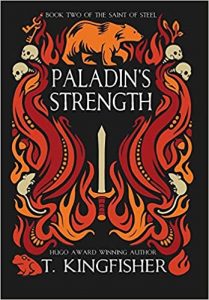 Marguerite just has to stay alive long enough to find the artificer. For that, she’ll need bodyguards who can’t be bribed or bought, seduced or suborned. She needs a paladin – or two.
Marguerite just has to stay alive long enough to find the artificer. For that, she’ll need bodyguards who can’t be bribed or bought, seduced or suborned. She needs a paladin – or two.
Little does she know that both of her bodyguards are quite capable of being seduced. Just not in any of the ways that she ever expected – and with none of the results that could ever have been imagined.
Escape Rating A-: I’ve written a LOT to get to the point where I can talk about what I thought of the book, which makes a good metaphor for the book itself. Because Paladin’s Faith is a very big story of ‘hurry up and wait’. Marguerite’s literal task is to hurry up and get to the Court of Smoke then to spend endless amounts of time hoping that teeny-tiny clues will drop into her waiting ear. Or Wren’s or Shane’s waiting ears. While not giving themselves away to any agents of Red Sail who are undoubtedly lurking in hopes of discovering the exact same information.
It’s the spy game and a lot of actual spying is waiting for the ‘click’ of the right clue. Hurrying just gives the game away – which will get them all killed. Also a LOT of other people killed, as Paladins of the Saint of Steel do NOT go either gently or quietly into that good night. They ALWAYS take a lot of their enemies with them when they go. It’s what they are, it’s what they do, it’s what their god chose them for in the first place.
So a huge part of this book is taken up in that waiting and watching, and the frustration of not finding much while Marguerite knows her enemy is hot on her heels. The frustration of waiting for clues is compounded by the sexual frustration of BOTH Marguerite and Shane. The heat they generate practically steams off the page, to the point where the reader wants to groan right along with Marguerite as Shane carries out a mental routine of self-flagellation because he believes he shouldn’t and he’s not worthy and he’ll only fuck things up even more than they already are. Which honestly isn’t even POSSIBLE but his guilty complex is so damn loud that he can’t hear anything except the voice in his head telling him he’s a fuckup and that’s all he’s ever been or will be.
One of the best parts of, not just this book but the whole, entire series so far is that it is told in the author’s inimitable voice, and her character development is both always excellent and done with absolutely oodles of snark and self-realization layered with frequent, self-deprecating humor on all sides.
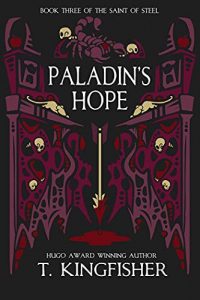 Howsomever, by the nature of that waiting game a LOT of this story is extremely interesting character development with a fair bit of adding to the depth of the worldbuilding but one does, like one of the side characters, Davith, want them to just ‘get on with it’ one way or another, either to get a move on in their mission or just make a move on each other.
Howsomever, by the nature of that waiting game a LOT of this story is extremely interesting character development with a fair bit of adding to the depth of the worldbuilding but one does, like one of the side characters, Davith, want them to just ‘get on with it’ one way or another, either to get a move on in their mission or just make a move on each other.
Once both of those things finally happen, the story is a race to a surprising and delightful finish.
In the beginning of this series, there were seven surviving Paladins of the messily departed Saint of Steel; Stephen, Istvhan, Galen, Shane, Wren, Marcus and Judith. Stephen’s story was told in the first book in the series, Paladin’s Grace, Istvhan’s in the second, Paladin’s Strength, Galen’s in the third, Paladin’s Hope, and now Shane’s in Paladin’s Faith. Which does lead on to the belief – or certainly to the HOPE, that there will be three more books in the series. Based on events in this book, Wren’s is likely to be next – which would be awesome. And Judith’s story is going to be a humdinger. But whatever or whoever’s story is coming next, I’m already looking forward to it!

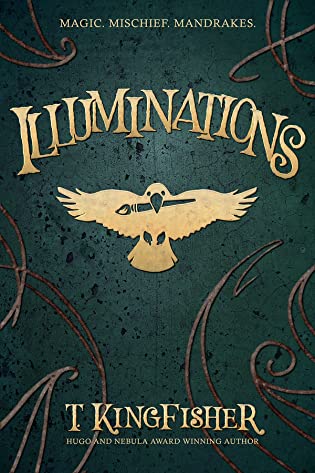 Illuminations by
Illuminations by 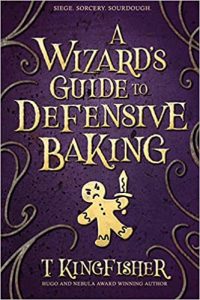 Escape Rating B: I picked up Illuminations because I was hoping for another incredibly awesome book like
Escape Rating B: I picked up Illuminations because I was hoping for another incredibly awesome book like  While the recommendations I’ve seen say that if I want more like
While the recommendations I’ve seen say that if I want more like 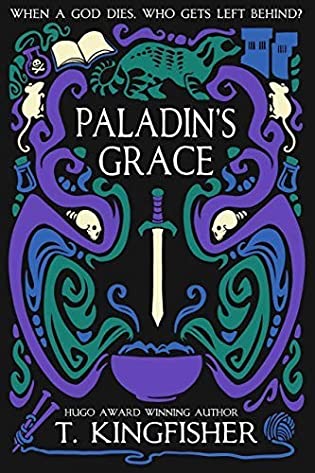 Paladin's Grace by
Paladin's Grace by 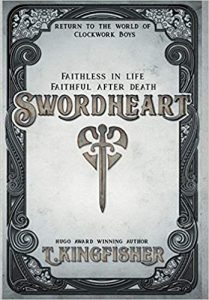 The setting of this story is plenty epic. It’s also set in the same world as her
The setting of this story is plenty epic. It’s also set in the same world as her 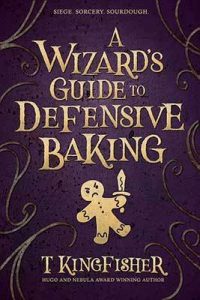 That’s the point where I remembered I had Paladin’s Grace, and that I absolutely LOVED this author’s
That’s the point where I remembered I had Paladin’s Grace, and that I absolutely LOVED this author’s